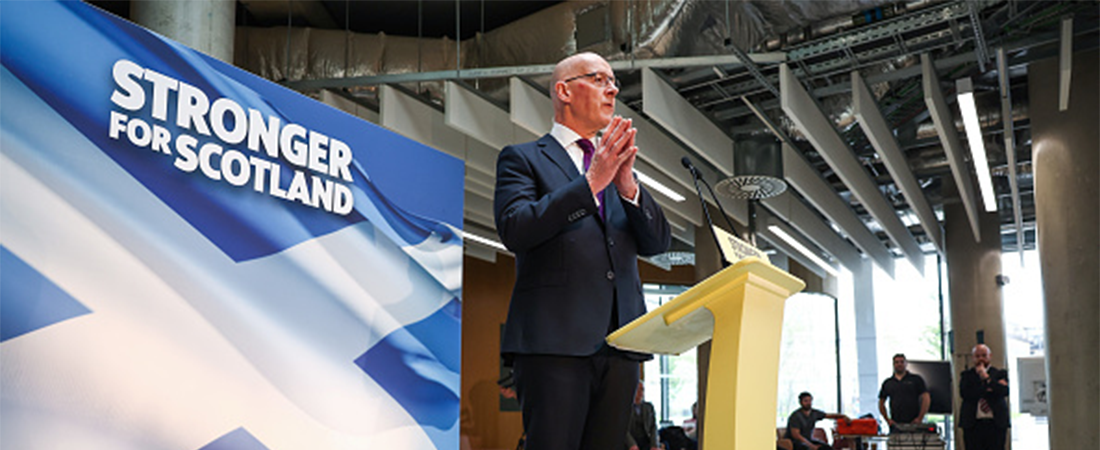If a week is a long time in politics, the past fortnight must have seemed like a lifetime for the SNP. We began with Humza Yousaf setting out to mark a new chapter in his premiership by terminating the power-sharing agreement with the Scottish Greens, and we ended with John Swinney taking the reins of the SNP for the second time.
But unlike his ill-fated venture as party leader in 2000, the impact of Swinney’s performance at the helm of the SNP won’t just be felt across nationalist benches. His subsequent success could bear heavily on the British electoral landscape for years to come.
Few in the corridors of Holyrood were surprised to see Swinney coronated leader. He is one of the SNP’s most experienced lieutenants and is considered the safe pair of hands needed to help the nationalists navigate these choppy waters. However, as he prepares the SNP for arguably its most important poll since the 2014 independence referendum, the new First Minister must tackle three major challenges in his first weeks in office.
His ability to overcome these challenges could have significant implications for the rest of the UK. Michael Thrasher’s recent analysis of England’s local election results suggests Labour could fall short of an overall majority at the coming General Election. However, this projection is based on current polling levels for the SNP being maintained.
A stronger-than-expected showing from the nationalists—or a further slip in support—could be the difference between Keir Starmer forming a majority government or bartering for the support of smaller parties in a hung parliament. How events play out in Holyrood over the next six months could be key to the UK’s political stability over the coming parliament.
John Swinney’s first challenge is to reunite the party. The SNP is unique in that it encompasses one of the broadest coalitions of political beliefs—from conservative (small-c) highlanders to left-leaning central belters—united under the umbrella of a single cause: Scottish independence.
In pursuit of this goal, public unity was considered sacrosanct within nationalist ranks. Few risked speaking out against the leadership or offering alternative prospectuses. However, as the promise of independence in the near term faded from view for the foreseeable future, that much-vaunted unity has collapsed.
Swinney knows that divided parties don’t win elections. With two major polls looming over the horizon that could determine the fate of the independence campaign for the next decade, restoring discipline and getting the party to sing from the same hymn sheet once again is an immediate priority.
Promoting Kate Forbes to Deputy First Minister sends a strong message to her supporters. It signals a move away from the unpopular policies that blighted Yousaf’s administration and a renewed focus on fundamental issues, namely the economy, education, and health.
His second challenge is bringing stability to the party. Over the past 13 months, the SNP has been rocked by scandal and unrest as Nicola Sturgeon, her husband Peter Murrell, and former Party Treasurer Colin Beattie were each arrested and questioned as part of Police Scotland’s investigation into suspected financial fraud. Last month, Murrell was charged with embezzlement of funds.
Unsurprisingly, this saga has not played well with the public. Recent polling suggests the party’s grip on the Scottish electorate has ended, with the nationalists falling second place behind Scottish Labour and projected to lose over two-thirds of their MPs at the coming election. These figures are a far cry from the SNP which dominated the Scottish electoral map during the 2010s.
Swinney will hope for a period of calm to restore the image of the SNP in the public’s eye and allow him to reset the party’s electoral fortunes. Making it to summer recess without any further drama will be considered a success.
Finally, Swinney must reconcile with the Scottish Greens. While the SNP has scarce appetite for a return to the Bute House Agreement, the First Minister cannot escape parliamentary arithmetic – the government is two seats short of a majority.
John Swinney will need to rely on the support of the Greens to provide stability and pass budgets, but the past fortnight has shown the support of their former partners cannot be assumed. The Greens were quick to dispense with Humza Yousaf, and their abstention on Swinney’s selection as First Minister (and refusing to support Forbes as his deputy) was a public show of intent.
Whether Swinney opts for a formal arrangement or a looser confidence and supply agreement remains to be seen. Still, this parliament has two years left, and his administration desperately needs stability to give the SNP any hope of being returned to office in 2026.
There is no doubting John Swinney’s capabilities. He is perhaps the most experienced member of any party in Holyrood, having served on the sides of Alex Salmond and Nicola Sturgeon, and he is one of the Scottish Parliament’s fiercest debaters. But he is taking the party’s reins amidst more challenging circumstances than any of his predecessors inherited.
The impact of John Swinney’s success won’t be isolated to politics north of the border; how he fairs in his new role could also prove pivotal in determining the political futures of Keir Starmer and Rishi Sunak when the country finally heads to the polls.

